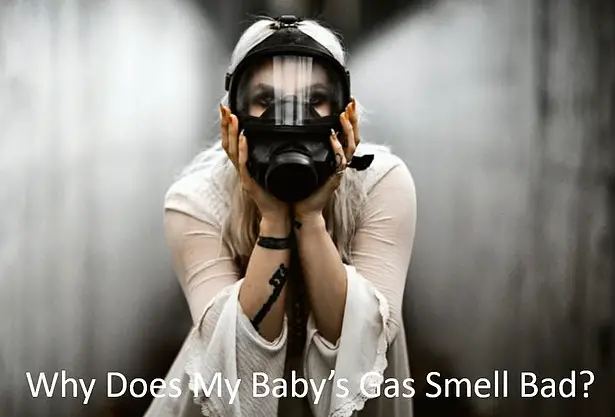Why Does My Baby’s Gas Smell Bad? (Here’s What You Need To Know)

Babies tend to be gassy creatures. Especially the newborns.
It is estimated that they can pass gas even 20 times a day. Which is nearly as much as an adult!
The good news is – excessive and smelly gas in newborns is quite normal and rarely a cause for concern.
Some babies seem gassier and more bothered by the gas than others. Moreover, they can produce really smelly farts.
Are these normal too? When should I worry about it?
Allow me to shed some light on the possible reasons for excessive, smelly farts produced by newborn babies.
Why Does My Baby’s Gas Smell Bad?
The primary cause of excessive gas in infants is their underdeveloped digestive system which lacks gut bacteria. In other words, the milk they are digesting goes through without a proper breakdown which results in excessive gas. Also, babies may swallow air during feeding, sucking on a dummy, or crying. Although most of the produced gas is odourless, the unpleasant smell is caused by sulfur. Sulfur is typically released during the digestion of sulfur-rich foods. A foul-smelling wind, paired with a runny green and foamy stool – may indicate a possible food allergy, most likely lactose, or stomach infection.
1. Why Do Babies Seem To Be Excessively Gassy?
Most babies experience bloat, burp, bleach, hiccups, or fart. Often, these symptoms are accompanied by stomach cramps which make the little bunny very irritated, fussy, and generally unhappy.
There are a few reasons why your baby is excessively gassy. Among them are the following:
1.1 Digestive System Development
Newborn babies produce excessive gas because their digestive system is still a “work in progress”.
Until birth, the baby absorbs all the nutrients from the mother’s blood, transported by the placenta via the umbilical cord. Any waste produced by the baby went back into the mother’s bloodstream via the same route.
Therefore, the baby’s gastrointestinal system (GI) was never used until birth. Moreover, it doesn’t contain any healthy gut bacteria, which is so helpful in digesting the milk.
Hence in the first few weeks of a baby’s life, her GI tract undergoes tremendous maturation and establishment of a healthy gut microbe. During these early days, babies digest proteins and fats very quickly without a proper breakdown (resulting in frequent dirty nappies!)
As a side effect, bloating and loud gasses often cause discomfort in babies’ little tummies.
***As a side note – due to their underdeveloped digestive systems, babies tend to lose weight, during the first few days of their lives.
1.2 Swallowing Air
Babies tend to swallow a lot of extra air through their mouths. This usually occurs during feedings due to excessive crying or sucking on a dummy.
All this extra air must come out one way or the other.
If you burp your baby thoroughly – the problem should be solved. Otherwise, the extra air will have to come out the other end.
You cannot prevent extra air intake during feeding due to excessive crying or sucking on the tummy, however, you can reduce the amount of air swallowed during feeding with a few adjustments. Below are a few of the most effective ones;
- When breastfeeding, ensure the baby has a proper, deep latch to reduce air intake during feeds.
- If your baby is formula-fed, hold the bottle almost horizontally and ensure that the teat is always full of milk. Ideally, use bottles that allow the air to vent out.
- And importantly – Burp your baby frequently, both during and after the feed.
1.3 Food Allergy
There is a common belief that certain foods, such as beans, lentils, dairy, broccoli, cabbage, etc., can cause bloating and gas in nursing mothers. Which, in turn, can also make their babies gassy.
But THAT IS NOT TRUE.
That’s because the gas produced in the mother’s digestive system cannot pass into her bloodstream and further into her breastmilk.
When the mother digests the food, some protein can pass into her bloodstream and enter her milk.
The same principle applies to the taste of milk. Some particularly fragrant foods can, in fact, change the flavour of breastmilk!
Coming back to the proteins… Some babies may be sensitive to or intolerant of these proteins, resulting in gas production.
If that is the case, the best way is to eliminate the most common allergens from their diet, starting with dairy, followed by soya and eggs. The baby’s upset stomach will hopefully be relieved by this dietary modification.
In addition to the foul-smelling gases and generally feeling unwell, you will probably notice runny, green, foamy poo from your baby with a food allergy. Sometimes, a small amount of mucus or blood can also be present in the stool.
As soon as your baby shows such symptoms, you should consult a doctor for advice on what you can do to soothe it.
1.4 Medicines Or Probiotics
One of the main benefits of probiotics is the relief of colic, constipation, and gas. However, a probiotic supplement containing an unsuitable bacterial strain can actually cause gas.
Moreover, any other medication may also change your baby’s microbe and tip it off balance, causing gas and excessive farting.
2. What does a baby’s fart smell like?
Most gas consists of odourless substances like carbon dioxide, nitrogen, oxygen, hydrogen, and methane.
The gas that has an unpleasant smell of rotten eggs is sulfur. Sulfur is produced in the large intestine (colon) by beneficial gut bacteria.
This smelly gas is a byproduct of breaking down undigested milk into components that can be absorbed into the blood and transported to different organs.
So, what is the “normal” smelling gas? Normal may be a broad spectrum, and it can vary from baby to baby.
2.1 Odourless
Smelly farts are as normal as the loud odourless ones. The difference is that stinky ones are produced by the digestion of milk, resulting in the release of sulfurous gas.
The odourless gas is basically hydrogen, carbon dioxide, and methane. And of course to the air swallowed during crying, sucking a dummy, or feeding.
2.2 Rotten Eggs (Sulfur)
The unpleasant smell of rotten eggs is actually sulfur.
Sulfur is an essential mineral that greatly benefits many body functions, including repairing DNA, protecting cells from damage. It also has an anti-inflammatory effect, reduces the risk of developing cardiovascular disease and reduces joint and muscle pain. In other words, sulfur is good for us, and we need it.
Sulfur can be easily acquired from many foods, including vegetables, nuts, legumes, red meat, fish, and eggs. These products are also rich in protein and fibre.
During digestion, these foods are turned into hydrogen sulfide by the gut bacteria, which causes excessive, unpleasant gas.
So, when a breastfeeding mother consumes a sulfur-rich diet, some of the protein produced during digestion can enter the milk. And the baby may react to this protein by releasing sulfur-smelling gas.
2.3 Foul-Smelling Gas
Farts that smell very strong, sour, and just really foul may indicate intolerance to particular nutrients or stomach infection. The most common intolerance in young babies is lactose.
So, if you are formula-feeding your baby, you may need to switch it to a lactose-free product. Before doing that, it is worth consulting your doctor first for advice on the best alternative formula.
If you are breastfeeding, make sure your baby gets both the foremilk, containing more sugars (lactose), and hindmilk – the fatty milk. If your baby drinks mostly foremilk – a thin watery bluish milk but not the fatty hindmilk, it could cause lactose overdose. Hence the symptoms of an allergic reaction.
Lactose that is not digested in the large intestine is fermented, which causes lots of gas. Therefore, the baby needs to empty one breast before moving to the other to maintain the right balance of nutrients in breast milk.
3. When Is Baby Gas Not Normal?
As a parent or carer, you know your baby best. This means you also know her gas habits, frequency and typical smell on a day-to-day basis. So, basically, you should be on the lookout for anything out of the ordinary. And this “out of ordinary” smell could potentially trigger a red alert.
Especially if your baby appears to be in pain or discomfort, cries a lot and produces foul-smelling green, foamy poo. This can likely indicate some problems with the digestion of dietary ingredients, such as lactose or stomach infection. If that’s the case, you should see a doctor for advice and treatment for your little one’s discomfort.
4. Final Few Lines
The first few months of baby life can be tough on them. Excess gas can be very disturbing for your baby, causing lots of discomforts and making her miserable.
The smelly wind is something that many young babies are experiencing.
If your baby’s wind may smell like rotten eggs, it is caused by sulfur and fibre-rich foods that a breastfeeding mom consumes.
Formula-fed babies, however, can be sensitive to modified milk proteins. And their immature digestive systems may have trouble digesting it. Also, when feeding with a bottle, you need to maintain an upright position to minimize air intake.
An allergy to some foods may occur if your baby’s gas has a strong, acidic smell and her stool is green, foamy, and contains mucus. If this occurs, you should contact your baby’s doctor for advice and the best treatment options.
Related Post ====> 7 Weird And surprising Facts About Babies That No One Told You

